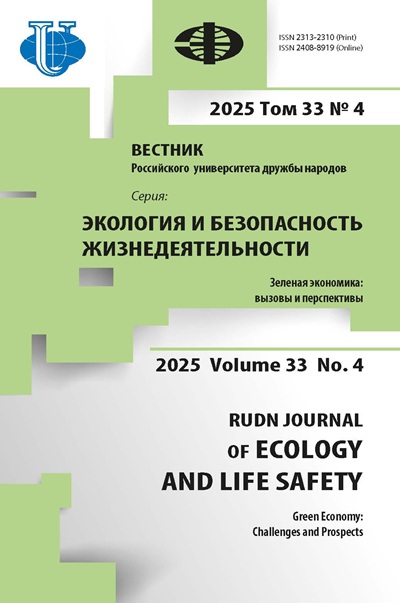Ecological and economic bases for development and implementation of carbon sequestration related climate projects in Russia
- Authors: Zakirova Y.L.1, Lazareva A.V.2
-
Affiliations:
- RUDN University
- MGIMO University
- Issue: Vol 32, No 4 (2024)
- Pages: 454-458
- Section: Short announcements
- URL: https://journals.rudn.ru/ecology/article/view/42526
- DOI: https://doi.org/10.22363/2313-2310-2024-32-4-454-458
- EDN: https://elibrary.ru/NNWDWA
- ID: 42526
Cite item
Full Text
Abstract
The article examines the emerging national carbon market in Russia, the incentives and competitive advantages of domestic business at the carbon market as the economic basis for development and implementation of carbon sequestration projects in Russia. The Russian Federation, which has committed itself to taking measures to mitigate climate change, has set a goal of achieving carbon neutrality by 2060 in two possible ways: through direct emissions reduction and carbon capture (sequestration), storage (deposition). The national carbon trading system being actively created in Russia allows the state to fulfill its international climate obligations, but at the same time act as an independent regulator in this area and proactively protect domestic producers from possible unfair competition and arbitrariness on the part of participants in the global carbon market.
Full Text
Our country is currently actively creating a domestic carbon trading system according to internal rules. The national carbon market will be represented in two segments: regulated and voluntary. The regulated segment of the domestic carbon market began with Federal Law 296-FZ of the Russian Federation dated July 2, 2021.[48] The law provides the basis for state accounting of emissions. At the same time, a phased introduction of carbon reporting is planned. According to the law, the circulation of carbon units is allowed in the territory of the Russian Federation, while quotas will be provided free of charge. Effective April 1, 2024, tax laws have been amended to cover climate projects with carbon credits. According to the amendments, the sale of operator services in the territory of Russia for conducting operations within the register of carbon units is not subject to taxation.[49] On February 13, 2023, Order of the Ministry of Economic Development No. 637 сame into force,[50] which establishes the form and procedure for the submission of a report on greenhouse gas emissions. Information on climate projects should be included in the carbon register, the results are verified for the release of carbon units. Russian expert organizations are being created to assess carbon reporting and verify the results of climate projects. In November 2021, the first Russian body for the validation and verification of greenhouse gases, the RUDN Institute of Environmental Engineering, was accredited by the Federal Accreditation Service - “Rosaccreditatsiya”. From March 1, 2022, to December 31, 2028, a pilot regional experiment is being conducted on Sakhalin to test and regulate, set up the mechanisms of the national accounting system, issuing quotas on emissions and trade in carbon units, assess its impact on the economic indicators of the region, and achieve carbon neutrality in the region by 2025. Other regions of the Russian Federation will be able to begin a regulated transition to carbon neutrality after the experiment on Sakhalin is completed (no earlier than 2025-2026) [1]. The following incentives for business as part of the climate agenda can be identified: political inevitability: legislation integrates business into the decarbonization process; the desire to maintain product profitability and competitive advantages at the domestic and foreign markets, to prevent a narrowing of the export market; soft government regulation: phased introduction of quotas, free quotas; tax benefits; eco-lending by banks with a reduced interest rate; the possibility of reducing the carbon footprint by implementing a climate project if direct emissions reduction is not possible, which is especially important for high-carbon industries; the ability to select the most economically feasible climate project; the possibility of creating your own carbon units and selling them at the domestic or foreign market; the opportunity to enter new markets; the possibility of attracting investments; the opportunity to occupy a niche and a leading position in the created domestic carbon market, as well as the external market, taking into account the unique natural features of the country; reputation of environmentally responsible suppliers and exporters. The competitive advantages of Russia as a participant in the carbon market are the following: a relatively small carbon footprint from production; one of the cleanest energy industries; significant reduction in direct greenhouse gas emissions (excluding sequestration) - by 30% since 1990 [2]; national climate legislation has been created in Russia; the country is conducting a regional experiment to achieve the goal of carbon neutrality; sequestration potential of the country; the unique geographical location of Russia, the largest area of territory, diversity of ecological systems and opportunities for implementing various climate projects. Thus, within the carbon market, Russia could act as a beneficiary, a leading supplier of climate projects attractive to investors.About the authors
Yulia L. Zakirova
RUDN University
Author for correspondence.
Email: zakirova_yul@rudn.ru
ORCID iD: 0000-0002-4258-6252
SPIN-code: 2757-0930
Ph.D., Master in Ecology and Nature Management, Associate Professor, the Department of Foreign Languages, Institute of Environmental Engineering
8/5 Podolskoe Shosse, Moscow, 115093, Russian FederationAnastasia V. Lazareva
MGIMO University
Email: a.lazareva@inno.mgimo.ru
ORCID iD: 0000-0002-1807-6375
SPIN-code: 1470-1234
Ph.D., Associate Professor, English Language Department 5
76, Prospect Vernadskogo, Moscow, 119454, Russian FederationReferences
- Other regions of Russia will be able to begin a rigorous transition to carbon neutrality only after the completion of the experiment on Sakhalin - Ministry of Economic Development. In: Energy Policy. 2023 Jun 15. (In Russ.). Available from: https://energypolicy.ru/drugie-regiony-rossii-smogut-pristupit-k-zhestkomu-perehodu-k-uglerodnoj-nejtralnosti-tolko-posle-zaversheniya-eksperimenta-na-sahaline-minekonomrazvitiya/novosti/2023/19/15/ ?ysclid=lzmuiejz32728459038 (accessed: 15.04.2024).
- Burmatov ES. The EU is trying to drag Russia into an economic war with the help of a “green tax”. In: Parliamentary newspaper. 2021 Aug 1. (In Russ.). Available from: https://www.pnp.ru/politics/burmatov-es-s-pomoshhyu-zelenogo-naloga-pytayutsya-vtyanut-rossiyu-v-ekonomicheskuyu-voynu.html?ysclid=lzmv1xgd6x331945895 (accessed: 15.04.2024).
Supplementary files















